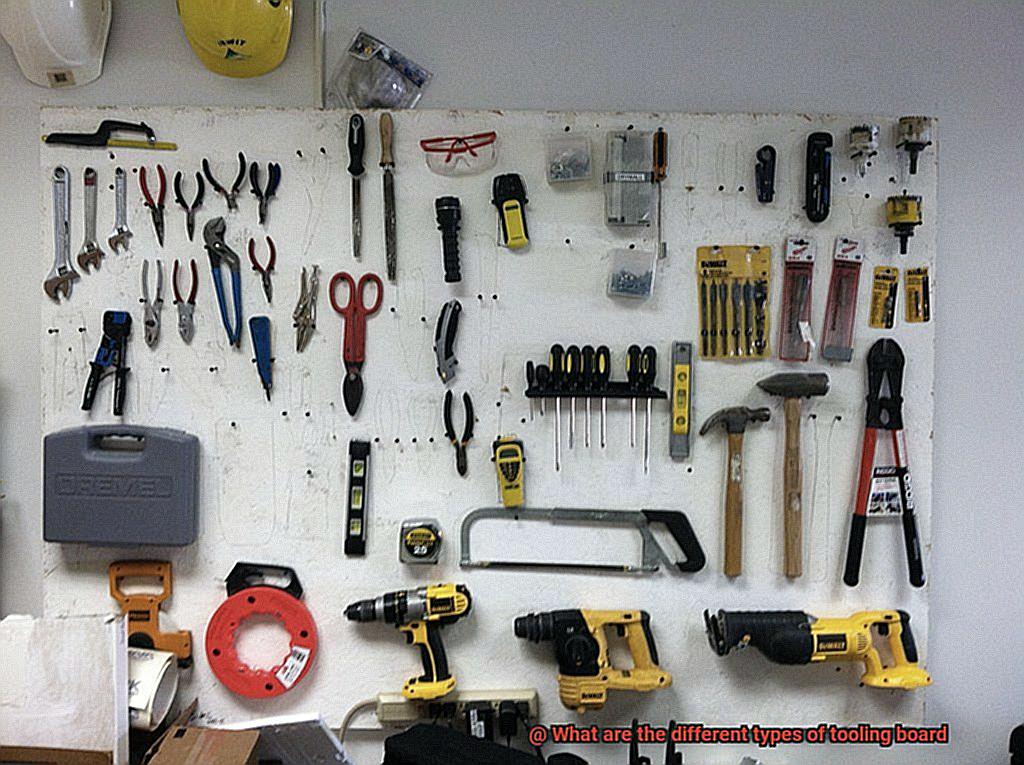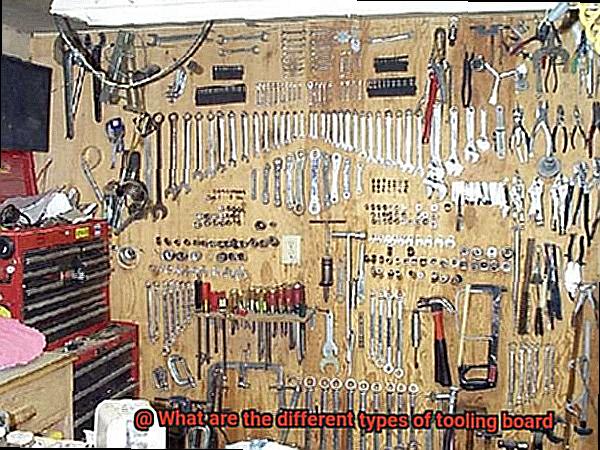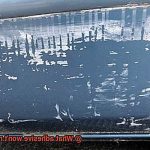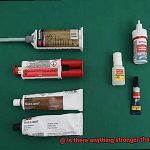Get ready to dive into the fascinating world of tooling boards. Whether you’re a seasoned engineer or just starting out in manufacturing, understanding the different types of tooling boards is crucial. These versatile materials, also known as modeling boards, are specifically designed for molding and tooling purposes. From creating prototypes to production molds, they can do it all.
But did you know that there are various types of tooling boards available? Depending on your desired outcome and manufacturing technique, each type has unique features that can significantly impact your end product. Some popular choices include polyurethane, epoxy, and composite boards. With varying degrees of hardness, machinability, and temperature resistance, choosing the right one is essential.
In this blog post, we’ll explore the world of tooling boards in-depth. We’ll take a closer look at each type’s strengths and weaknesses so that you can make informed decisions throughout your manufacturing process. By understanding these differences, you’ll save both time and money while achieving top-notch results.
So buckle up and get ready for an exciting ride as we delve deeper into the intriguing world of tooling boards.
What is Tooling Board?
Contents
It’s a remarkable material used in the manufacturing industry to create molds, prototypes, and other types of tooling. Tooling board is typically made from high-density polyurethane foam and is known for its durability, versatility, and ease of use. Let’s explore the fascinating world of tooling board together.
One of the most impressive benefits of using tooling board is its ability to be easily machined and shaped. This means that it can be used to create highly detailed and complex molds and prototypes with ease. Unlike other materials that may be difficult to manipulate, tooling board offers maximum flexibility, allowing manufacturers to bring their ideas to life.
Tooling board is also resistant to heat, chemicals, and other types of wear and tear, making it ideal for use in harsh manufacturing environments. This makes it a popular choice among manufacturers who need a material that can withstand challenging conditions without breaking down or losing integrity.
There are several different types of tooling board available on the market today. For instance, low-density foam boards are excellent for creating larger molds while high-density foam boards are better suited for creating more detailed molds. Epoxy-based boards offer exceptional dimensional accuracy while composite boards are perfect for creating lightweight parts.
When selecting a tooling board, it’s essential to consider factors such as the intended application, dimensional accuracy required, durability, and ease of machining. By choosing the right tooling board for your project, you can ensure high-quality results that meet your exact specifications.
Types of Tooling Board
Tooling boards are versatile materials that play a vital role in the creation of molds, prototypes, and fixtures across different industries. From polyurethane to phenolic, here are the different types of tooling boards and their unique properties that make them ideal for specific applications.
Polyurethane Tooling Board
If you’re looking for a tooling board with excellent machining capabilities, durability, and resistance to heat and chemicals, then polyurethane tooling board is an excellent choice. Its versatility makes it a popular option in the automotive, aerospace, and marine industries. You can easily shape, sand, and polish it to create complex designs without worrying about its structural integrity.
RenShape Tooling Board

RenShape tooling board is a high-density urethane foam that boasts superior dimensional stability and can withstand high temperatures without losing its shape or size. Its lightweight nature makes it easy to handle and transport, making it a popular choice in the automotive and aerospace industries.
Epoxy Tooling Board
Epoxy tooling board is perfect for applications that require high precision and dimensional stability. It’s known for its durability and resistance to heat, chemicals, and abrasion, making it ideal for creating durable molds and fixtures. Epoxy tooling board is also easy to machine, making it perfect for creating complex shapes.
PVC Foam Board
PVC foam board is a lightweight material that’s resistant to moisture and chemicals. It’s commonly used in the advertising and signage industry for creating displays and exhibits due to its ability to be easily cut, shaped, and printed on. PVC foam board is perfect for creating custom designs.
Phenolic Tooling Board
Phenolic tooling board is a high-density material that offers excellent dimensional stability and resistance to wear and tear. It’s commonly used in the automotive industry for creating molds for parts that require high accuracy and precision. Phenolic tooling board is also resistant to heat and chemicals, making it ideal for use in harsh environments.
Polyurethane Tooling Board
Look no further than polyurethane tooling board. Made from lightweight and strong polyurethane foam, this material is easily machined and can be shaped into various forms, making it ideal for creating molds and prototypes.
Polyurethane tooling board boasts excellent dimensional stability, meaning it will maintain its shape and size even after repeated use. This, coupled with its ability to withstand high temperatures and pressure, makes it a popular choice for creating molds for materials such as plastics, composites, and metals.
But not all polyurethane tooling boards are created equal. There are different types available on the market, each with its own unique properties and characteristics. Low-density foam boards are perfect for creating large-scale molds or prototypes due to their lightweight nature. On the other hand, high-density foam boards are more dense and sturdy, making them better suited for creating smaller and more intricate molds.
Furthermore, there are specialty boards like flame-retardant or conductive boards that serve specific purposes. Flame-retardant boards undergo special treatment to become resistant to fire while conductive boards contain additives that allow them to conduct electricity. These specialty boards are designed for specific applications where safety or conductivity is a concern.
Epoxy Tooling Board
This material is a popular choice in the manufacturing industry due to its exceptional strength, durability, and machinability.
One of the most significant advantages of epoxy tooling board is its ability to withstand high temperatures and pressures. Created by combining epoxy resin and a filler material like glass or carbon fibers, this material is a popular choice for creating molds, prototypes, and tools for industries like aerospace and automotive.
But that’s not all – epoxy tooling board is also resistant to chemical corrosion. This makes it ideal for use in harsh environments where other materials may deteriorate over time. Plus, it maintains its shape and size even when exposed to changes in temperature, thanks to its low coefficient of thermal expansion.
When it comes to machining, epoxy tooling board is an excellent choice for creating complex shapes and designs. It can be easily cut, drilled, and shaped using standard machining tools, making it a cost-effective solution for manufacturers.
The versatility of epoxy tooling board is another major advantage. Different grades of this material are available on the market, each with unique properties and characteristics. For instance, high-temperature epoxy tooling board is perfect for applications that require exceptional heat resistance. Low-density epoxy tooling board is an excellent option when you need a lightweight solution. And if you’re looking for flame-retardant properties, there’s an epoxy tooling board grade that meets those needs as well.
RenShape Tooling Board
As an expert in the field, I highly recommend this polyurethane board for its incredible strength, durability, and machinability.
RenShape Tooling Board is the go-to material for creating prototypes, models, and tooling. Its high-density composition allows for easy machining to achieve intricate shapes and designs. But what sets it apart is its exceptional dimensional stability. Unlike other materials that warp or shrink under different temperatures or humidity levels, RenShape Tooling Board maintains its shape with ease.
Not only that, but RenShape Tooling Board is also resistant to chemicals and solvents. This makes it perfect for use in harsh environments where other materials may deteriorate or corrode. And with a range of densities available, manufacturers can choose the perfect density for their specific application needs.
Low-density RenShape Tooling Board is ideal for creating larger parts with a lightweight design, while high-density RenShape Tooling Board is better suited for producing smaller parts with higher strength requirements. And let’s not forget about its versatility – RenShape Tooling Board can be machined using standard woodworking tools and can be painted or finished to achieve the desired surface finish.
PVC Foam Board
Say hello to PVC foam board – the superhero of tooling boards. As an expert in this field, I can confidently say that PVC foam board is the go-to choice for various industrial applications, thanks to its lightweight, durable, and versatile properties.
PVC foam board is made from polyvinyl chloride (PVC) foam, which is not only lightweight but also resistant to water, chemicals, and UV rays. This makes it an ideal choice for outdoor and marine applications. Additionally, PVC foam board comes in two main types: celuka and free-foam.
Celuka PVC foam board has a solid outer skin layer, making it harder and more rigid than its free-foam counterpart. Due to its structural strength, it is perfect for building and construction, furniture production, and automotive manufacturing. On the other hand, free-foam PVC foam board has a softer and more flexible surface due to its porous structure. It is commonly used in signage, advertising, and display applications.
The versatility of PVC foam board doesn’t stop there. It’s also lightweight and easy to handle, making transportation and installation hassle-free. Even better, it can be cut, drilled, and machined with standard woodworking tools for easy customization and shaping.
PVC foam board can also be laminated with various materials such as aluminum, wood veneer, or acrylic sheets to achieve different aesthetic effects. This means that you can have the durability and versatility of PVC foam board while still achieving the look you desire.
Tooling Block
Tooling blocks might not be the most glamorous component in manufacturing, but they play a crucial role in creating molds, patterns, and prototypes. These blocks are made from high-density materials that can withstand the pressure and heat generated during the manufacturing process.
There are two main types of tooling blocks: epoxy and polyurethane. Epoxy tooling blocks are known for their high dimensional stability, excellent surface finish, and resistance to high temperatures. They’re ideal for applications that require high accuracy and repeatability. Polyurethane tooling blocks offer excellent machinability, good chemical resistance, and low thermal expansion. They’re commonly used in the automotive and aerospace industries for creating molds and prototypes.
But it doesn’t stop there. Hybrid tooling blocks are also available, combining the benefits of both epoxy and polyurethane. These blocks offer superior mechanical properties, excellent surface finish, and dimensional stability.
When selecting a tooling block, it’s important to consider factors such as application requirements, machining capabilities, and budget. For instance, if you need to create molds or prototypes for the aerospace or automotive industries, a polyurethane block might be your best bet. Alternatively, if you require high accuracy and repeatability, an epoxy block would be more suitable.
It’s crucial to consult with a knowledgeable supplier or manufacturer who can guide you in selecting the best tooling block for your job. With their expertise and understanding of different types of tooling blocks available, you’ll make an informed decision that meets your needs and budget.
Advantages and Limitations of Different Types of Tooling Boards
If you’re looking to create a prototype or mold for your latest project, tooling boards are an excellent option. Tooling boards come in different types and each type has its own set of advantages and limitations. In this blog post, we will explore the advantages and limitations of five different types of tooling boards.
Polyurethane Tooling Board
Polyurethane tooling board is a lightweight and durable option that is easy to machine, sand, and paint to achieve the desired finish. Its excellent dimensional stability and high tensile strength make it ideal for applications that require high accuracy and precision. However, it may not be suitable for applications that require high strength or impact resistance.
Epoxy Tooling Board
Epoxy tooling board is perfect for applications that require durability and impact resistance. It has excellent strength and stiffness properties, making it ideal for creating tools that can withstand harsh environments. However, it can be brittle if not cured properly, making it more difficult to machine than other types of tooling boards.
RenShape Tooling Board
RenShape tooling boards are known for their excellent dimensional accuracy and surface finish. They have a low coefficient of thermal expansion, making them ideal for applications that require precise tolerances. However, RenShape tooling boards are relatively expensive compared to other types of tooling boards.
PVC Foam Board
PVC foam board is a lightweight and rigid material that is easy to cut and shape. It has good impact resistance and low water absorption, making it suitable for certain applications such as signage and displays. However, it may not be as durable as other types of tooling boards.
Tooling Block
Tooling blocks are large blocks of material that can be cut down to size to create custom molds or patterns. They are available in different materials such as polyurethane, epoxy, and aluminum. Tooling blocks are ideal for creating large-scale molds and tools that require high precision and accuracy. However, they can be expensive compared to other types of tooling boards.
_ryvNR7kckM” >
Conclusion
In summary, mastering the nuances of different tooling boards is a must-have skill for any engineer or manufacturer who wants to create top-notch molds, prototypes, and fixtures. With varying degrees of hardness, machinability, and temperature resistance, selecting the right tooling board can make all the difference in your end product while saving you precious time and money.
Polyurethane tooling board reigns supreme as a popular choice due to its exceptional machining capabilities, durability, and resistance to heat and chemicals. RenShape Tooling Board boasts unparalleled dimensional stability and surface finish, while PVC foam board offers lightweight versatility that’s hard to beat. Epoxy tooling board is renowned for its strength, durability, and high precision. Lastly, tooling blocks provide large-scale molds with high accuracy that’s perfect for heavy-duty applications.
Each type of tooling board comes with its own unique set of advantages and limitations that need to be weighed carefully before making a decision. It’s essential to seek guidance from knowledgeable suppliers or manufacturers who can help you select the best material for your specific application needs.
By immersing yourself in the fascinating world of tooling boards deeply, manufacturers can bring their ideas to life effortlessly while achieving top-notch results that meet their exact specifications.






